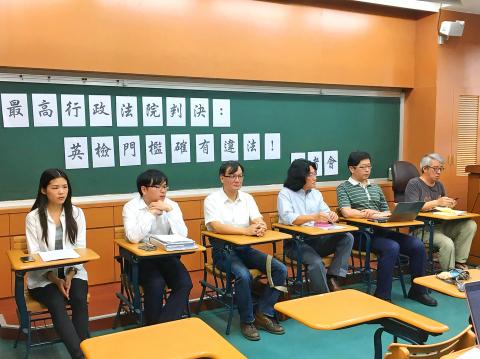A group of National Chengchi University (NCCU) students yesterday called on students across the nation to protest against school regulations requiring foreign-language proficiency exams.
The Supreme Administrative Court last month ruled that requiring students to take proficiency exams before they may attend remedial courses exceeds the parameters of university autonomy.
However, while NCCU in January abolished the foreign-language proficiency requirement, more than 100 universities in Taiwan still enforce such a requirement, said plaintiff Lai Yi-ling (賴怡伶), a graduate of the university.

Photo: Lin Hsiao-yun, Taipei Times
Student Rights Association leader Hsu Jen-yu (許人友) told a news conference that the association has launched an “abolish zero-credit courses” movement.
Universities should not offer fake courses, nor should they mandate arbitrary graduation standards, NCCU student council leader Chen Po-han (陳柏翰) said, adding that universities should return to offering regular courses to better enhance students’ English-language abilities.
“It is illogical to impose a rule that students may not attend remedial courses unless they have failed an exam,” Lai said.
In 2016, Lai sued NCCU for refusing to issue her diploma because she had not provided a language proficiency test score.
The court last month ruled in favor of NCCU, but said that university regulations demanding that students take foreign-language proficiency exams before they can attend remedial courses exceeds the parameters of university autonomy.
“Universities are given autonomy so they would be able to offer better education,” said lawyer Chen Yi-tsung (陳易聰), who is representing Lai pro bono.
Current regulations “do not fit the goal of education,” Chen Yi-tsung added.
While the ruling seemed to be in the university’s favor, it has nonetheless pointed out the logical fallacy behind language proficiency tests, so it actually favors students, he said.
Hopefully, the majority of universities would observe the court ruling and return to the essential tenets of education, Lai said.
NCCU Department of Sociology director Huang Hou-ming (黃厚銘) said that the tests, originally intended to promote globalization, have become vapid and funnel students toward either British or American English.
While the case was an individual incident, the ruling says that university autonomy must remain rational, NCCU Department of Law associate professor Chen Chih-hui (陳志暉) said.
Determining student capabilities is a university’s task, and ensuring that students meet the standard is the true function and goal of universities, and should not be contracted to outside companies, Chen Chih-hui said.
NCCU Department of Radio and Television professor Kuo Li-hsin (郭力昕) said that he harbors no ill will toward the English language — having studied in the US and the UK for his master’s and doctoral degrees — but examinations do not allow students to become more fluent.
Exams instead make English a superior language to which people should aspire, a common reaction in post-colonial nations, Kuo said.

Chinese Nationalist Party (KMT) Chairman Eric Chu (朱立倫), spokeswoman Yang Chih-yu (楊智伃) and Legislator Hsieh Lung-chieh (謝龍介) would be summoned by police for questioning for leading an illegal assembly on Thursday evening last week, Minister of the Interior Liu Shyh-fang (劉世芳) said today. The three KMT officials led an assembly outside the Taipei City Prosecutors’ Office, a restricted area where public assembly is not allowed, protesting the questioning of several KMT staff and searches of KMT headquarters and offices in a recall petition forgery case. Chu, Yang and Hsieh are all suspected of contravening the Assembly and Parade Act (集會遊行法) by holding

PRAISE: Japanese visitor Takashi Kubota said the Taiwanese temple architecture images showcased in the AI Art Gallery were the most impressive displays he saw Taiwan does not have an official pavilion at the World Expo in Osaka, Japan, because of its diplomatic predicament, but the government-backed Tech World pavilion is drawing interest with its unique recreations of works by Taiwanese artists. The pavilion features an artificial intelligence (AI)-based art gallery showcasing works of famous Taiwanese artists from the Japanese colonial period using innovative technologies. Among its main simulated displays are Eastern gouache paintings by Chen Chin (陳進), Lin Yu-shan (林玉山) and Kuo Hsueh-hu (郭雪湖), who were the three young Taiwanese painters selected for the East Asian Painting exhibition in 1927. Gouache is a water-based

Taiwan would welcome the return of Honduras as a diplomatic ally if its next president decides to make such a move, Minister of Foreign Affairs Lin Chia-lung (林佳龍) said yesterday. “Of course, we would welcome Honduras if they want to restore diplomatic ties with Taiwan after their elections,” Lin said at a meeting of the legislature’s Foreign Affairs and National Defense Committee, when asked to comment on statements made by two of the three Honduran presidential candidates during the presidential campaign in the Central American country. Taiwan is paying close attention to the region as a whole in the wake of a

OFF-TARGET: More than 30,000 participants were expected to take part in the Games next month, but only 6,550 foreign and 19,400 Taiwanese athletes have registered Taipei city councilors yesterday blasted the organizers of next month’s World Masters Games over sudden timetable and venue changes, which they said have caused thousands of participants to back out of the international sporting event, among other organizational issues. They also cited visa delays and political interference by China as reasons many foreign athletes are requesting refunds for the event, to be held from May 17 to 30. Jointly organized by the Taipei and New Taipei City governments, the games have been rocked by numerous controversies since preparations began in 2020. Taipei City Councilor Lin Yen-feng (林延鳳) said yesterday that new measures by